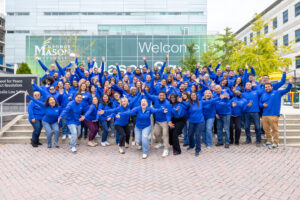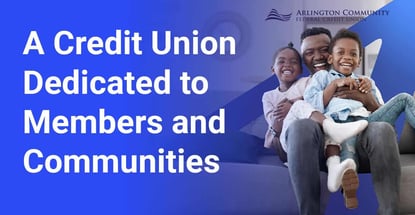A Credit Union Where Member and Community Service Go Hand in Hand to Produce Remarkable Results
分享
十月 11, 2024
CardRates.com Feature Article In a Nutshell: We’re fans of credit unions — their not-for-profit model shifts the focus of financial services from satisfying investors to helping people achieve their hopes and dreams. In Virginia communities near our nation’s capital, Arlington Community Federal Credit Union views that people-first approach as a catalyst for mutual empowerment. From products that make members’ lives better to a renewed emphasis on financial education, employee volunteerism, and support for creative nonprofits, Arlington Community FCU puts the cooperative benefits of the credit union model at the heart of everything it does.
Did 19th-century French novelist and playwright Alexandre Dumas invent credit unions? No, but the one-for-all, all-for-one attitude in his famous novel, “The Three Musketeers,” typifies the American credit union movement’s relationship with communities.
阿灵顿社区联邦信贷联盟, which serves Virginia’s Arlington and Fairfax counties near Washington, D.C., makes us feel confident we’re on the right track with that analogy. While the team at Arlington FCU views each small victory with a member or community resident as the personal triumph it is, it also sees the whole as greater than the sum of its parts.
In the novel, the three musketeers and their protégé D’Artagnan promise to elevate their mutual needs above their individual concerns. The group also pledges to help each member get out of any trouble that may arise.
It’s the same for Arlington FCU. Members pledge financial resources to create products and services that make their lives better. But they also reach out as a collective through the credit union’s education and charitable support to help individuals and businesses in the community learn, contribute, and achieve more.
The point in the novel and at Arlington FCU is that things work both ways. When a credit union reaches out to its community with education and support, it makes things better for everyone, not just those who directly receive the benefit.
America’s credit union movement started small and gathered steam during the Great Depression as for-profit banks receded into crisis. Today, credit unions strive to be everywhere Americans need and want them to be.
That’s fortunate because more individuals are struggling these days with everything from depleted saving accounts to food and housing insecurity — not to mention a national credit card debt of $1.1 trillion (and seemingly everything in between).
We agree with Libby Snipe, Arlington FCU’s Vice President of Community Impact and Communications, that financial education and community support from a credit union can be a chief driver of social equity.
“We know our neighbors and the challenges they face,” Snipe said. “When we give people a chance, they then in turn become a more contributing member of the cooperative.”
Rewards Cards Offer Everyday Opportunities to Redeem
That’s why we believe the credit union model is indispensable to how we face our future together. But it’s a little more challenging at the credit union level than it is in a novel.
Instead of three musketeers and a protégé, Arlington FCU’s mutual support society consists of a team of about 100 team members, 24,000 credit union members, and potentially every student, consumer, and small business in Arlington and Fairfax counties, an area with a population of about 1.4 million.
Arlington FCU serves residents of the independent cities of Alexandria and Falls Church in addition to those in Arlington and Fairfax counties. The job of the credit union’s 100 employees is to meet as many members, residents, and business owners as possible with products, services, and solutions to help them achieve their version of success.
Libby Snipe is Arlington FCU’s Vice President of Community Impact and Communications.
“Our tagline is remarkable people deserve remarkable service, and we feel everyone is remarkable in their own way,” Snipe said. “We like to think big, set ambitious goals, and work to have a deeper and broader impact in our community.”
The first order of business is attracting member deposits through compelling products and services. One way Arlington FCU gets there is by applying out-of-the-box thinking to its credit card program.
For example, the Signature Rewards Visa and Platinum Rewards Visa card products not only offer a compelling rewards package in terms of bang for your buck, but they also give cardholders maximum flexibility in how they use their points.
The Signature Rewards Visa earns 3x points on travel, dining, groceries, and gas and 1.5x points on everything else. The Platinum Rewards Visa earns 2x points on dining, groceries, and gas everywhere. One of the features Snipe personally takes advantage of is the ability to redeem points every day.
“When you go to the gas pump or if you purchase online, you get a text that asks if you want to pay with points,” Snipe said. “Instead of amassing rewards over several years and then figuring out how to apply them to a flight, you can earn and redeem at the same time.”
Education as the Cornerstone of Equity and Inclusion
Arlington FCU offers a low-APR Classic Visa for those who prefer to carry a monthly balance on their credit card and a secured card for collateral-based credit building. Members who need a secured card may come to that choice through consultation with a team member. The credit union always looks at accounts for savings opportunities and provides education for context and better decision-making.
“We’re always trying to empower our members by thinking about the challenges they’re facing and how our products, services, coaching, and counseling can get them through their next hurdle,” Snipe said.
Arlington FCU carries the federal low-income credit union designation and is a federally certified Community Development Financial Institution (CDFI). Those designations put it at the forefront of area efforts to boost financial literacy among underserved and underbanked populations. They explain its mid-2024 commitment to increase its financial education investment fivefold moving into 2025.
Arlington Community FCU sponsors many educational events, such as this Reality Store real-world money management simulation activity designed specifically for teens held at the Arlington County Virginia Cooperative Extension office.
“Our community impact programming centers around financial literacy programs, not only for our members, but also for clients of our local safety net nonprofits, participants in county programs, public school students and families, and even detainees in our local detention center,” Snipe said.
An example is a partnership with several Arlington and Alexandria nonprofits focused on workforce development for women coming out of incarceration. Starting with explaining the difference between a credit union and a bank, Arlington FCU team members provide whatever instruction it takes to help clients with a lot on their plates. That includes showing them how to manage their finances, work with creditors and other providers, and budget and save toward goals.
To help, the credit union provides an exclusive no-fee checking account with direct deposit from jobs they’ve received through the partnership. The account eliminates overdraft fees for a year to help clients get back on their feet. Snipe said the credit union considers it a pilot program.
“The vision is to take the input from the nonprofit and the women in the program and scale the program so we can impact and financially empower even more people,” Snipe said.
Community Solutions Bring Positive Change
The bond between the three musketeers and D’Artagnan allows the four to survive and triumph over their adversaries. None of the musketeers are perfect, but they make up for each other’s weaknesses with collective strength.
Not every community member who needs to become a credit union member will apply, but those who do will ultimately make the community stronger. In contrast to for-profit institutions that codify risk aversion into their culture, underwriting at Arlington FCU looks beyond the numbers to the story behind them.
“We actually have a conversation with the member to understand what their challenges are, how banks have potentially them in the past, and what their goals are,” Snipe said. “Decisions can change once you hear the story and see how things came to be.”
The credit union sometimes schedules monthly calls to ensure members stay on track with their budgets and goals. It has been able to underwrite deeply and even make some riskier moves when the potential borrower’s story justifies action. Surprisingly, perhaps, its delinquency 和 charge-off ratios are lower than those of their national peers.
“If you’ve had a stumbling block and you’re not able to fix it yourself, people just get deeper and deeper in, and there’s just not enough good resources to help,” Snipe said. “When we take chances on members who deserve it, they become really loyal to us, and they pay us first.”
That enables more support to committed area nonprofits and financial education investments. Snipe said Arlington FCU will continue to measure impact and assess the success of its program choices moving forward.
She said it’s essential because so many people in northeastern Virginia need that second chance. Team members volunteer hundreds of hours to assist area nonprofits in their mission.
“We’re passionate about making a difference and feel the purpose in our work,” Snipe said. “We’re dedicated to helping people through tough times and deepening our impact in the community.”





